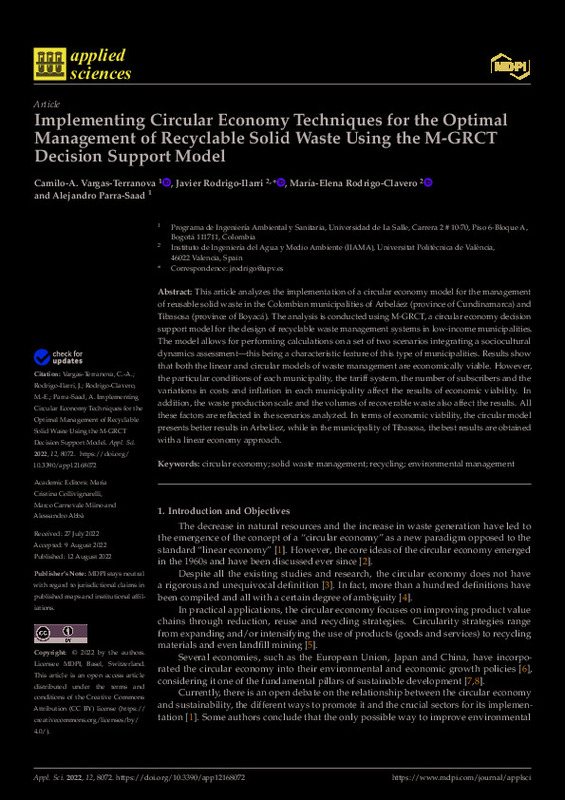JavaScript is disabled for your browser. Some features of this site may not work without it.
Buscar en RiuNet
Listar
Mi cuenta
Estadísticas
Ayuda RiuNet
Admin. UPV
Implementing Circular Economy Techniques for the Optimal Management of Recyclable Solid Waste Using the M-GRCT Decision Support Model
Mostrar el registro sencillo del ítem
Ficheros en el ítem
| dc.contributor.author | Vargas-Terranova, Camilo-A
|
es_ES |
| dc.contributor.author | Rodrigo-Ilarri, Javier
|
es_ES |
| dc.contributor.author | Rodrigo-Clavero, María-Elena
|
es_ES |
| dc.contributor.author | Parra-Saad, Alejandro
|
es_ES |
| dc.date.accessioned | 2023-05-15T18:01:51Z | |
| dc.date.available | 2023-05-15T18:01:51Z | |
| dc.date.issued | 2022-08 | es_ES |
| dc.identifier.uri | http://hdl.handle.net/10251/193378 | |
| dc.description.abstract | [EN] This article analyzes the implementation of a circular economy model for the management of reusable solid waste in the Colombian municipalities of Arbelaez (province of Cundinamarca) and Tibasosa (province of Boyaca). The analysis is conducted using M-GRCT, a circular economy decision support model for the design of recyclable waste management systems in low-income municipalities. The model allows for performing calculations on a set of two scenarios integrating a sociocultural dynamics assessment-this being a characteristic feature of this type of municipalities. Results show that both the linear and circular models of waste management are economically viable. However, the particular conditions of each municipality, the tariff system, the number of subscribers and the variations in costs and inflation in each municipality affect the results of economic viability. In addition, the waste production scale and the volumes of recoverable waste also affect the results. All these factors are reflected in the scenarios analyzed. In terms of economic viability, the circular model presents better results in Arbelaez, while in the municipality of Tibasosa, the best results are obtained with a linear economy approach. | es_ES |
| dc.language | Inglés | es_ES |
| dc.publisher | MDPI AG | es_ES |
| dc.relation.ispartof | Applied Sciences | es_ES |
| dc.rights | Reconocimiento (by) | es_ES |
| dc.subject | Circular economy | es_ES |
| dc.subject | Solid waste management | es_ES |
| dc.subject | Recycling | es_ES |
| dc.subject | Environmental management | es_ES |
| dc.subject.classification | INGENIERIA HIDRAULICA | es_ES |
| dc.title | Implementing Circular Economy Techniques for the Optimal Management of Recyclable Solid Waste Using the M-GRCT Decision Support Model | es_ES |
| dc.type | Artículo | es_ES |
| dc.identifier.doi | 10.3390/app12168072 | es_ES |
| dc.rights.accessRights | Abierto | es_ES |
| dc.contributor.affiliation | Universitat Politècnica de València. Escuela Técnica Superior de Ingenieros de Caminos, Canales y Puertos - Escola Tècnica Superior d'Enginyers de Camins, Canals i Ports | es_ES |
| dc.description.bibliographicCitation | Vargas-Terranova, C.; Rodrigo-Ilarri, J.; Rodrigo-Clavero, M.; Parra-Saad, A. (2022). Implementing Circular Economy Techniques for the Optimal Management of Recyclable Solid Waste Using the M-GRCT Decision Support Model. Applied Sciences. 12(16):1-17. https://doi.org/10.3390/app12168072 | es_ES |
| dc.description.accrualMethod | S | es_ES |
| dc.relation.publisherversion | https://doi.org/10.3390/app12168072 | es_ES |
| dc.description.upvformatpinicio | 1 | es_ES |
| dc.description.upvformatpfin | 17 | es_ES |
| dc.type.version | info:eu-repo/semantics/publishedVersion | es_ES |
| dc.description.volume | 12 | es_ES |
| dc.description.issue | 16 | es_ES |
| dc.identifier.eissn | 2076-3417 | es_ES |
| dc.relation.pasarela | S\470298 | es_ES |
| dc.contributor.funder | Universitat Politècnica de València | |
| dc.subject.ods | 03.- Garantizar una vida saludable y promover el bienestar para todos y todas en todas las edades | es_ES |








